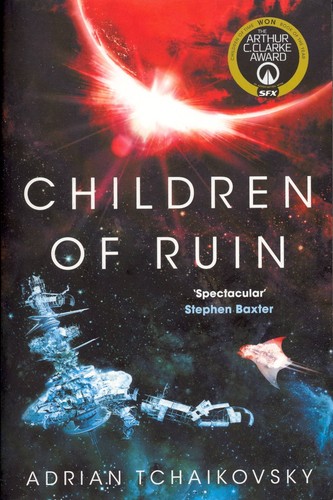Pentapod reviewed Children of Ruin by Adrian Tchaikovsky
Review of 'Children of Ruin' on 'Goodreads'
5 stars
This is the sequel to "Children of Time" and you should definitely read the first book before reading this one or it won't make a lot of sense. But read the first one, it's also an amazing book, and then come back and read this one!
"Children of Ruin" mirrors the structure of "Children of Time" by jumping between two different time periods - the far past and the near present, which slowly converge over the course of the book as we see how they relate. The "far past" section deals with another terraforming ship, colleagues of Dr. Kern from "Children of Time", who went to a different planet with the intent to terraform it, only to find it already inhabited by non-intelligent life, the first actual alien life anyone has found. Rather than destroy it to make a new world for humans, they opt to terraform another planet in the same system that is less habitable due to being mostly ocean, but unoccupied. One team goes to investigate the occupied world, while a second team works on the terraforming, and because it is a water world, includes the creation of an uplifted breed of octopus intended to be the humans' helpers.
Without getting into too many spoilers, things go badly wrong, and many thousands of years later when a joint Human/Portiid expedition from Kern's World arrives in the system, they find a race of spacefaring octopods who are so panicked by the sight of a human being that it sparks a violent space battle and the remainder of the book involves the Kern's World alliance trying to figure out how to communicate with octopods, and why the sight of a human and even the suggestion of them visiting either of the populated worlds in the system induces terror to the point of open warfare.
I loved the spiders in "Children of Time" and the way Tchaikovsky believably describes their evolution into an intelligent, tool-using civilization without losing their spider-ness, and the only thing that could have delighted me more than the Portiid race is when he does just as well with the intelligent octopods. This book also has some moments of serious creepiness which were chilling and scary, and plenty of action as well as a thoughtful discussion of the problems of communication that would obviously exist when Humans, Portiids, and octopods attempt to learn to communicate. Dr. Kern is back also in ship's-computer form, and also a key part of the plot.
I felt the ending was resolved a little quickly and a bit predictably if you'd read the first book, as there are many parallels between the structure of the first book and this sequel. However, still lots of great and unique details along the way and some really alien aliens, so if you loved the first book this one is a must-read too. Definitely leaves room open for another sequel also.

